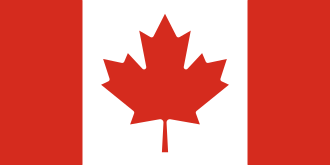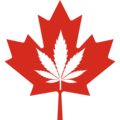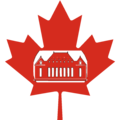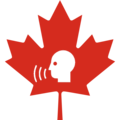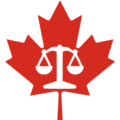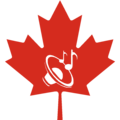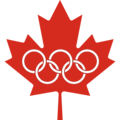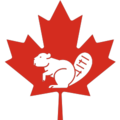Portal:Canada
| Showcase | Contents | Contributing |
Introduction
Canada is a country in North America. Its ten provinces and three territories extend from the Atlantic Ocean to the Pacific Ocean and northward into the Arctic Ocean, making it the second-largest country by total area, with the longest coastline of any country. Its border with the United States is the longest international land border. The country is characterized by a wide range of both meteorologic and geological regions. With a population of over 41 million, it has widely varying population densities, with the majority residing in its urban areas and large areas being sparsely populated. Canada's capital is Ottawa and its three largest metropolitan areas are Toronto, Montreal, and Vancouver.
A developed country, Canada has a high nominal per capita income globally and its advanced economy ranks among the largest in the world by nominal GDP, relying chiefly upon its abundant natural resources and well-developed international trade networks. Recognized as a middle power, Canada's support for multilateralism and internationalism has been closely related to its foreign policies of peacekeeping and aid for developing countries. Canada promotes its domestically shared values through participation in multiple international organizations and forums. (Full article...)
Featured article -

The Yukon Quest, formally the Yukon Quest 1,000-mile International Sled Dog Race, is a sled dog race scheduled every February since 1984 between Fairbanks, Alaska, and Whitehorse, Yukon, switching directions each year. Because of the harsh winter conditions, difficult trail, and the limited support that competitors are allowed, it is considered the "most difficult sled dog race in the world", or even the "toughest race in the world"—"even tougher, more selective and less attention-seeking than the Iditarod Trail Sled Dog Race." The originator envisioned it as "a race so rugged that only purists would participate." (Full article...)
Current events
- November 2, 2025 – Canada–Philippines relations
- Canada and the Philippines sign a visiting forces agreement allowing military personnel to train in each other's territories. (Reuters)
- October 29, 2025 – 2025 Alberta teachers' strike
- In the Canadian province of Alberta, premier Danielle Smith says legislation has been passed to end the strike, invoking the notwithstanding clause to prevent court challenges of the legislation's constitutionality. (CBC) (Global News)
- October 25, 2025 – Canada–United States trade relations
- 2025 United States trade war with Canada and Mexico
- U.S. president Donald Trump announces that he will raise U.S. tariffs on Canada by 10% in retaliation for an anti-tariff advertisement sponsored by the Ontario government. (The Guardian)
- October 23, 2025 – 2025 United States trade war with Canada and Mexico, Canada–United States trade relations
- U.S. president Donald Trump announces all trade negotiations with Canada are "terminated" following an advertisement featuring former U.S. president Ronald Reagan released by the government of Ontario. (CBC)
- October 6, 2025 –
- A teachers' strike in Alberta begins, making 51,000 teachers off-work and affects more than 700,000 students. Thousands rally across Alberta to support educators (CBC) (Global News) (The Globe and Mail)
Selected panorama -
National symbol -

The Canadian (French: cheval canadien) is a horse breed from Canada. It is a strong, well-muscled horse, usually dark in colour. It is generally used for riding and driving. Descended from draft and light riding horses imported to Canada in the late 1600s from France, it was later crossed with other British and American breeds. During the 18th century the Canadian horse spread throughout the northeastern US, where it contributed to the development of several horse breeds. During the peak popularity of the breed, three subtypes could be distinguished, a draft horse type, a trotting type and a pacing type. Thousands of horses were exported in the 19th century, many of whom were subsequently killed while acting as cavalry horses in the American Civil War. These exports decreased the purebred Canadian population almost to the point of extinction, prompting the formation of a studbook and the passage of a law against further export. (Full article...)
Selected vital article -

Multiculturalism in Canada was officially adopted by the government during the 1970s and 1980s. The Canadian federal government has been described as the instigator of multiculturalism as an ideology because of its public emphasis on the social importance of immigration. The 1960s Royal Commission on Bilingualism and Biculturalism is often referred to as the origin of modern political awareness of multiculturalism, resulting in Canada being one of the most multicultural nations in the world. The official state policy of multiculturalism is often cited as one of Canada's significant accomplishments, and a key distinguishing element of Canadian identity and Canadian values. (Full article...)
Selected picture -
Featured biography -
Margaret Eleanor Atwood (born November 18, 1939) is a Canadian novelist, poet, literary critic, and inventor. Since 1961, she has published 18 books of poetry, 18 novels, 11 books of nonfiction, nine collections of short fiction, eight children's books, two graphic novels, and a number of small press editions of both poetry and fiction. Her best-known work is the 1985 dystopian novel The Handmaid's Tale. Atwood has won numerous awards and honors for her writing, including two Booker Prizes, the Arthur C. Clarke Award, the Governor General's Award, the Franz Kafka Prize, the Prince of Asturias Award for literature, and the National Book Critics and PEN Center USA Lifetime Achievement Awards. A number of her works have been adapted for film and television. (Full article...)
Did you know -

- ... that Katherine Henderson led efforts to reverse the gender pay gap in Canadian curling?
- ... that the Perth Panthers, a Scotland-based ice hockey team, were composed mainly of Americans and Canadians?
- ... that a member of the House of Lords was the principal of a Canadian junior school?
- ... that artist Agnes Gallus fled Hungary for Canada during the 1956 revolution?
- ... that Joe Wirkkunen coached the Finland men's national ice hockey team after receiving a recommendation from Canada?
- ... that the only populated place on Kaipokok Bay in Labrador, Canada, is Postville?
- ... that Canadian heritage minister Pascale St-Onge was the bassist in an all-lesbian alternative rock quartet?
Featured list -
The Supreme Court of Canada is the highest court of Canada. It was established by the Parliament of Canada through the Supreme and Exchequer Court Act of 1875. Since 1949, the Court has been the final court of appeal in the Canadian justice system. Originally composed of six justices (the Chief Justice of Canada and five puisne justices), the Court was expanded to seven justices by the creation of an additional puisne justice position in 1927, and then to nine justices by the creation of two more puisne justice positions in 1949. (Full article...)
Canadian content search
Associated Wikimedia
The following Wikimedia Foundation sister projects provide more on this subject:
-
Commons
Free media repository -
Wikibooks
Free textbooks and manuals -
Wikidata
Free knowledge base -
Wikinews
Free-content news -
Wikiquote
Collection of quotations -
Wikisource
Free-content library -
Wikiversity
Free learning tools -
Wikivoyage
Free travel guide -
Wiktionary
Dictionary and thesaurus

